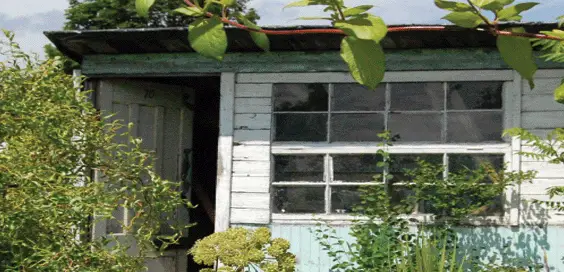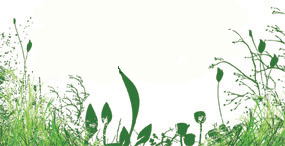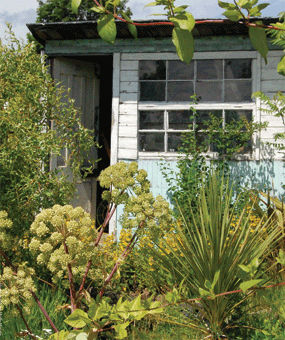The Joys of Allotment Gardening

Losing the Plot
by Barney Bardsley
Three years ago, in my first column for On: Yorkshire, I wrote of a lovely wild little place – an eccentric jumble of vegetables, fruit and flowers and an experiment in “the good life” at the edge of an inner city Leeds estate. A second home, or, rather, an escape from home. My Oakwood Lane allotment. This ragged plot, complete with magnificent old shed and dusty little pond, become a sanctuary to me for the seven years after I was first given the keys to its kingdom, till now.
This is a feeling other allotment holders will easily understand, but the inveterate city kids among you might find hard to fathom. Suffice it to say that my scrubby patch of land gave back health and peace of mind after a long and arduous time in my life. This phenomenon is becoming increasingly well documented. There is even an established nationwide scheme offering asylum seekers* their own piece of land, on which to grow the vegetables and plants they knew back home – helping them to dig away their trauma and depression. The humble trowel as a therapeutic tool? The muddy vegetable strip as a metaphor for contentment and simple well being? You bet.
“Colourful, multi-cultural spaces”
 Over the years I have watched the demographic on my own allotment subtly change. The elders are still there, ploughing their productive furrows, year after year, but now there are others – teenagers, people in their twenties, young families, immigrants and harassed city workers – who all show that the recent and growing trend for people to return to the land, at least in miniature, to find solace and to re-kindle an ancient skill, is both real and lasting. No longer the province of the man in a flat cap, gloating over his enormous onions, allotments have become colourful, multi-cultural spaces.
Over the years I have watched the demographic on my own allotment subtly change. The elders are still there, ploughing their productive furrows, year after year, but now there are others – teenagers, people in their twenties, young families, immigrants and harassed city workers – who all show that the recent and growing trend for people to return to the land, at least in miniature, to find solace and to re-kindle an ancient skill, is both real and lasting. No longer the province of the man in a flat cap, gloating over his enormous onions, allotments have become colourful, multi-cultural spaces.
There is something deeply sane about the simplicity of a garden. Dig. Plant. Weed. Watch. Enjoy. And my particular allotment became not only an old friend, but rather a famous little character in its own right – much photographed and written about; even, briefly, the star of day time television. Meanwhile, at the turn of every season, the same bit-part actors would appear, with unflinching regularity, whatever the weather.
The blossom on the apple and pear trees. The tadpoles in the pond. The intransigent bloody brambles by the compost bin. The heavenly honeysuckle, scrambling over the arch. The autumn leaves, crimson and red. The winter mud. I can honestly say that the hours spent sitting on my shed step, leaning in against the wall and gazing out at the willows in the wild hedge below me, were some of the most peaceful and profitably aimless of my life. But now it’s over.
“Watch it flourish”
 According to Oscar Wilde, in the Ballad of Reading Gaol, “Each man kills the thing he loves”. It seems that women do a bit of that too, because I have just parcelled up my gate keys in a jiffy bag and sent it off to the allotment secretary. I have given up my plot. It’s someone else’s turn now. Seven years is a whole cycle of time. Things change. People do too. My child is grown up and my dog has grown old. I shall be moving house to somewhere smaller. The garden out the back – and its wilder cousin up at the allotment – must become the playground for another generation.
According to Oscar Wilde, in the Ballad of Reading Gaol, “Each man kills the thing he loves”. It seems that women do a bit of that too, because I have just parcelled up my gate keys in a jiffy bag and sent it off to the allotment secretary. I have given up my plot. It’s someone else’s turn now. Seven years is a whole cycle of time. Things change. People do too. My child is grown up and my dog has grown old. I shall be moving house to somewhere smaller. The garden out the back – and its wilder cousin up at the allotment – must become the playground for another generation.
There are some people who dig the same garden for decades. My parents did that, right up to my father’s death earlier this year, at 86. The garden they made together, wove through nearly half a century of their lives, and that of their family. Only after they both died has the house been sold, and the garden handed over to someone else. Other people create something, watch it flourish, and then – through choice or force of circumstance – move on. I am one of those. But the garden is as much about the mind, as it is the ground. And you take that with you, wherever you go.
“A piece of land becomes a garden”
I started small, as many people do, with window boxes in a top floor London flat. Moving to Leeds meant a proper little garden – a patch at the front of a shared house. Then the allotment – wild space, expansive – and a bigger garden in a different house. Each of these gardens have borne certain signature notes: similar plantings, preferred colour schemes, my own particular architectural style.
Just as a house becomes a home only when a person layers it with their own personality and style – even with their presence, their breath, and the imprint of their foot, so a piece of land becomes a garden through the spirit of its creator. But in the end it is all just borrowed space – and pleasurably stolen time. Something to store in photographs, memory, imagination.
“Rough, but beautiful”
I have a Greek friend and mentor who lives in a rough part of Brixton, South London, in a tiny house with an even tinier front yard. Through the power of his yearning for Cyprus, the birthplace he left when he was a young man (he is now in his sixties), he has created a magical island-like garden, built on the top of a wall and spilling down into the foot-wide space by his own front door. “If I had to,” he says, “I would grow plants in the palms of my hands.” Gardens pop up everywhere, once you feel the need for them.
Who knows where my next one will appear? I only know this. The allotment will always be my absolute favourite. She was a rough darling, but beautiful. I snuck past the other day and peered over the fence. The old shed is still there, but someone has already mended the door (which I neglected to do for seven years, preferring to run at it with a well-padded shoulder and heave). So it’s in safe hands then. Time to move on.
‘A Handful of Earth’ by Barney Bardsley is published by John Murray










[…] Yorkshire, brought me an expanded canvas: first, a little front garden, then a rough and sprawling allotment, a heavenly escape from domestic duties, which I took at every […]
GARDENS “teenagers, people in their 20s, young families, immigrants and harassed city workers” Allotment gardening .. http://t.co/dzFIR7PZ6R
GARDENS: Feeling like getting into allotment gardening now that spring is on the horizon? http://t.co/dzFIR7PZ6R #gardening